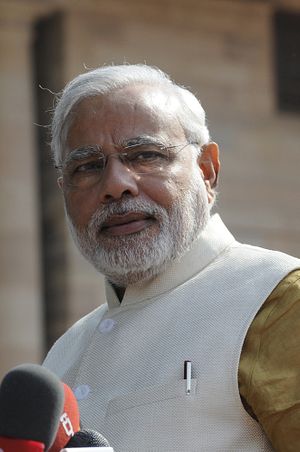Describing the Indian Parliament as the sanctum sanctorum of democracy and urging all members of Parliament to work in a “spirit of cooperation and mutual accommodation,” President Pranab Mukherjee opened the budget session on Monday. This is an important session for the Modi government. It wants to pass six ordinances this session, including an increase in the foreign direct investment in insurance from 26 percent to 49 percent, and changes to the land acquisition bill. Opposition parties have united to oppose the land acquisition bill, stating that the bill will force farmers and the poor to lose their lands. Last year, the government used an executive order to amend the land acquisition bill and facilitate the buying of land for industrial projects. Anti-corruption campaigner Anna Hazare also began his protest in New Delhi this week demanding that the government withdraw their changes to the bill.
But it will be the annual budget presentation tomorrow that will have a lasting impact on the future of the Modi government. Anticipation is high that the Modi government will announce sweeping economic reforms when Finance Minister Arun Jaitley unveils his first full-year budget tomorrow. In its first budget presented in July 2014, the Modi government focused on infrastructure development, streamlining of subsidies and easing restrictions on foreign investment. Though it was seen as lacking in ambition, two aspects in particular – an increase in foreign investment in insurance defense sectors to 49 percent – were widely welcomed.
The Modi government has also initiated an overhaul of creaky labor rules; cutting the power of labor inspectors and slashing the red tape for small companies that makes India one of the toughest places in the world to do business. It has agreed to allow private Indian companies to mine and sell coal at an unspecified future date, setting the stage for the biggest liberalization of the industry in more than 40 years. Some of the important reforms that are in the process of being implemented include raising FDI limit in insurance to 49 percent from the current 26 percent, changing land acquisition laws, amending archaic labor laws, implementing nation-wide service tax, and cutting wasteful subsidies on fuel, fertilizer and food. Defying his own party’s old guard with their belief in swadeshi, or self-sufficiency and distrust of foreign companies, the Modi government has been calling major powers to enter the full range of Indian industries and rolling out the red carpet for the global corporate sector with his “Make in India” campaign. At the same time, Modi has also been keen to reach out to the wider public with his projects related to construction of toilets and a program to help all Indian open bank accounts.
And yet there is disappointment that the Modi government has not done enough to usher in major economic reforms in his first six months in office. Despite a number of important initiatives, a perception has been gaining ground that there is no broader vision behind government policies; that everything is random. The Modi government has not yet made an all-encompassing argument – so its various policies don’t add up to more than the sum of their parts. Without a groundbreaking argument about why the Modi government is radically different from its predecessors, it may have had to rely on tactical gimmicks to stay afloat. It needs a frame to organize its responses and the myriad problems confronting the nation. In most successful political careers, there is a purpose; a guiding philosophy which is the foundation, and all the rest is secondary. A number of separate, discrete and seemingly unconnected strands do not coherence make. India stands on the threshold of momentous social, economic and global changes and Modi has the potential to act larger than the moment, being propelled by something deeper than the last news cycle. He also needs to reaffirm at this juncture that India is an organic entity; that no interest, no class, so section is either separate or supreme above the interests of all.
The annual budget offers the Modi government an opportunity to change the narrative, to tell the Indians and the outside world that it means business. More important, the Modi government needs to put in place a program of action that will allow the country reach its full potential.

































